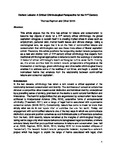Deviant Leisure: A Critical Criminological Perspective for the Twenty-First Century
| dc.contributor.author | Raymen, Thomas | |
| dc.contributor.author | Smith, Oliver | |
| dc.date.accessioned | 2019-03-26T15:40:40Z | |
| dc.date.issued | 2019-03-20 | |
| dc.identifier.issn | 1572-9877 | |
| dc.identifier.issn | 1572-9877 | |
| dc.identifier.uri | http://hdl.handle.net/10026.1/13542 | |
| dc.description.abstract |
This article argues that the time has arrived for leisure and consumerism to become key objects of study for a twenty-frst century critical criminology. As global capitalism struggles to sustain itself, it is creating myriad crises in areas such as climate change, mental health, personal debt, and unemployment. Using a zemiological lens, we argue that it is on the feld of commodifed leisure and consumerism that criminologists can see these metacrises of liberal capitalism unfold. Therefore, this article positions the burgeoning deviant leisure perspective as a new and distinct form of twenty-first critical criminology—one that departs from traditional criminological approaches to leisure rooted in the sociology of deviance in favor of critical criminology’s recent zemiological turn to social harm. In doing so, this article outlines how the deviant leisure perspective’s emergence at the intersection of zemiology, green criminology and ultra-realist criminological theory enables it to address some of the realities of our times, as well as how the deviant leisure perspective can help explain the normalized harms that emanate from the relationship between commodifed leisure and consumer capitalism. | |
| dc.format.extent | 115-130 | |
| dc.language | en | |
| dc.language.iso | en | |
| dc.publisher | Springer Verlag | |
| dc.title | Deviant Leisure: A Critical Criminological Perspective for the Twenty-First Century | |
| dc.type | journal-article | |
| dc.type | Journal Article | |
| plymouth.author-url | https://www.webofscience.com/api/gateway?GWVersion=2&SrcApp=PARTNER_APP&SrcAuth=LinksAMR&KeyUT=WOS:000467011900009&DestLinkType=FullRecord&DestApp=ALL_WOS&UsrCustomerID=11bb513d99f797142bcfeffcc58ea008 | |
| plymouth.issue | 1 | |
| plymouth.volume | 27 | |
| plymouth.publisher-url | https://link.springer.com/article/10.1007/s10612-019-09435-x#citeas | |
| plymouth.publication-status | Published | |
| plymouth.journal | Critical Criminology | |
| dc.identifier.doi | 10.1007/s10612-019-09435-x | |
| plymouth.organisational-group | /Plymouth | |
| plymouth.organisational-group | /Plymouth/Faculty of Arts, Humanities and Business | |
| plymouth.organisational-group | /Plymouth/Faculty of Arts, Humanities and Business/School of Society and Culture | |
| plymouth.organisational-group | /Plymouth/REF 2021 Researchers by UoA | |
| plymouth.organisational-group | /Plymouth/REF 2021 Researchers by UoA/UoA18 Law | |
| plymouth.organisational-group | /Plymouth/Research Groups | |
| plymouth.organisational-group | /Plymouth/Research Groups/Institute of Health and Community | |
| plymouth.organisational-group | /Plymouth/Users by role | |
| plymouth.organisational-group | /Plymouth/Users by role/Academics | |
| dcterms.dateAccepted | 2019-03-08 | |
| dc.rights.embargodate | 2020-3-19 | |
| dc.identifier.eissn | 1572-9877 | |
| dc.rights.embargoperiod | Not known | |
| rioxxterms.version | Accepted Manuscript | |
| rioxxterms.versionofrecord | 10.1007/s10612-019-09435-x | |
| rioxxterms.licenseref.uri | http://www.rioxx.net/licenses/all-rights-reserved | |
| rioxxterms.licenseref.startdate | 2019-03-20 | |
| rioxxterms.type | Journal Article/Review |


